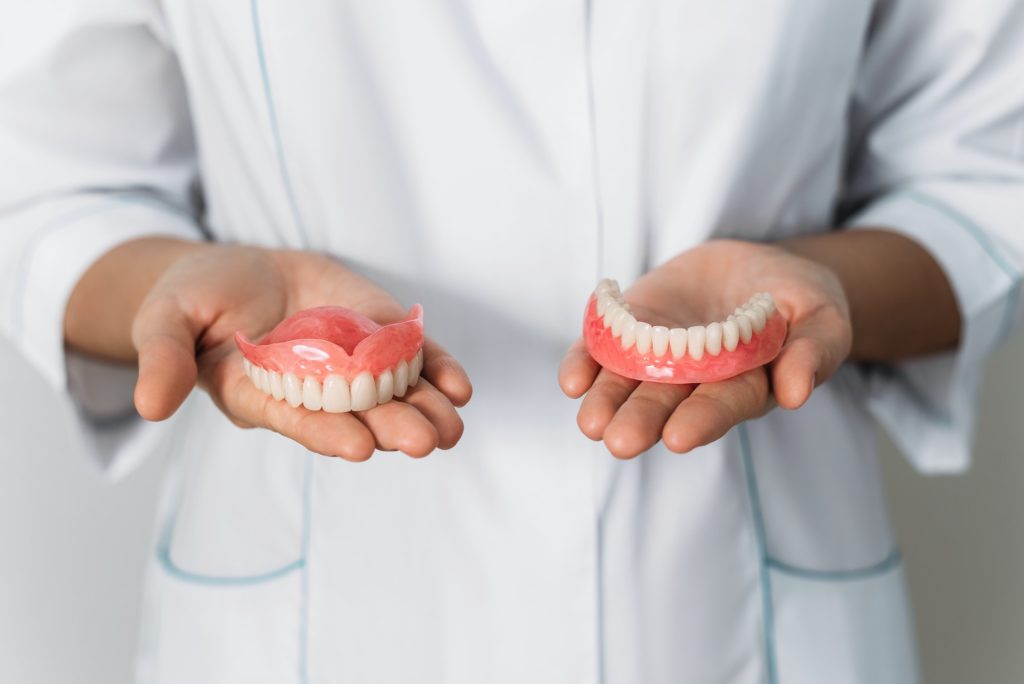Do you need Affordable Dentures?

Learn more about affordable dentures, types of dentures including partial dentures, snap on dentures, and types of denture glue and adhesives, and caring for your dentures.
Table of Contents
There are a few things you should know if it’s time for you to consider dentures. Your dentist will recommend what’s best for you, but you should also understand the types of dentures available for different dental issues, as well as the proper way to care for your new dentures and the different types of denture glue or adhesive on the market.
What Are the Types of Dentures?
Let’s start with the types of dentures that are used; full or complete, which are both upper and lower sets that can be removed and often are used to replace missing teeth. Partial which replace sections of missing teeth, temporary dentures that can be used while you are waiting for dental implants, and many more, including flexible, fixed bridges, cantilever bridges, and of course, dental implants or implant-supported fixed dentures. We’ll provide a brief explanation of each and show you what they look like below.
1. Full Dentures
Full or complete dentures, consist of both upper and lower sets and are removable devices that are used to replace missing teeth. Full dentures are made out of porcelain or acrylic and are held together by either an acrylic or metal base. You may need full ones if you lose all of your teeth and want to fill out your smile again and wear it with confidence.
They are generally both upper and lower that rest on the gum tissue and are held in place by suction. Some people also use denture adhesive to help secure them and prevent food from getting between the gums and dentures which can cause discomfort. If you properly maintain them, they can last anywhere from 5–10 years.
2. Partial Dentures
Upper and/or lower partial dentures are designed and typically used to fill in gaps created by missing teeth. Partials are clipped into the mouth using existing teeth for support and can be unclipped and removed as desired. If you’re missing a few teeth and are hesitant to smile or self-conscious about your missing teeth, this could be the route for you.
3. Temporary Dentures
Temporary dentures are also sometimes called immediate dentures. Temporary dentures can be fitted right after your teeth have been removed before you get an implant. They’re a great option to help you look and feel more normal while waiting for your new implants or permanent ones to be fitted to your mouth and fill the gap that’s been left by any missing or extracted teeth.
4. Fixed Bridge
Dentists use and recommend fixed bridges to replace missing teeth by surgically cementing an artificial tooth, commonly known as a crown, to the remaining natural teeth on each side. Like other surgically fixed dentures—including implants, implant–supported dentures, and snap-ons—fixed bridges will usually cost a bit more than removable.
5. Cantilever Bridge
We recommended a cantilever bridge when a molar is missing, and there are no teeth on one side of the missing molar to support a bridge. One or more teeth on the other side of the mouth can be used for support instead.
6. Implants
Dental implants are surgically placed into the bone and eventually fuse with the jaw bone over time for a natural feeling experience. Dental implants essentially mimic the roots of your teeth and are then fitted with a prosthetic tooth made from a mold of your actual tooth. This can be a fairly long process between extraction of the existing tooth or remnants of that tooth, the healing process, insertion of the implant post, molding of the porcelain prosthetic tooth, and finally installing the prosthetic tooth. Sometimes the process can take up to 6 months.
7. Implant-Supported Fixed Dentures
Implant-supported fixed dentures feature a crown that is secured to surgically inserted implants in your jawbone and kept in place with screws.
8. Snap-on dentures
Snap-on dentures are removable crowns that snap on and off of surgical implants in your jawbone. This is a common choice for people who want to chew the foods they love without worrying about them coming loose.
How to Care for Your Dentures
Regardless of the style of denture you have, it’s important to practice proper hygiene and take care of your dentures. There are many products on the market today that make it easy to adhere to or clean your dentures. Polident, OAP, Dr. Berland’s, XODENT, M3 Naturals, and Efferdent cleansers and adhesives are just a few. We recommend trying a few different ones until you find the brand and strength that works best for you. Caring for them may unfortunately also include the need for a denture repair kit. Several are on the market, including Repair-it brand denture repair kit and Denture Doctor. In some cases, you may want to make an appointment with your dentist or orthodontist to properly fix or replace them.
Next Steps on Your Denture Journey
To determine the dentures that are right for you at your affordable and friendly dentist near you in Connecticut or Rhode Island, check our locations page today.
Denture FAQs
Dental prosthesis called dentures are used to replace missing teeth. There are several types of dentures, including complete, partial, implant-supported, and immediate dentures.
Dentures are a great way to put the sparkle and the shine back into your smile, providing you with the freedom to enjoy life again with a full set of comfortable, great-looking teeth.
There are several types of dentures, including complete, partial, implant-supported, and immediate dentures. Complete replace all of the teeth in the upper or lower jaw, while partial dentures replace only a few missing teeth. Implant-supported are anchored to dental implants, while immediate dentures are placed immediately after teeth are extracted.
Full dentures, also known as complete dentures, are dental prosthetics that replace all of the teeth in the upper or lower jaw. They are used when all of the natural teeth are missing or need to be extracted. They are custom-made to fit the patient’s mouth and are typically held in place by suction or dental adhesive.
To care for your dentures, it is important to brush them daily with a soft-bristled brush and non-abrasive denture cleaner. Avoid using hot water or harsh chemicals, as they can damage them. It is also important to remove and rinse your dentures after eating to remove any food particles.
When not in use, store them in a clean, dry place, either in water or a special denture solution. Finally, be sure to see your dentist regularly to check the fit and ensure they are in good condition. There are many products on the market today that make it easy to adhere to or clean your dentures. Polident, OAP, Dr. Berland’s, XODENT, M3 Naturals, and Efferdent cleansers and adhesives are just a few.
To determine which type of dentures are right for you, you should consult with a dental professional. We have locations in and around Connecticut and Rhode Island. Check out the nearest location to you here!
They will evaluate your oral health and recommend the best option based on your specific needs. Factors such as the number of missing teeth, the condition of your remaining teeth and gums, and your budget will all be taken into consideration. Additionally, your dentist will take impressions of your mouth and create a custom treatment plan to ensure the best possible fit and function of your dentures.
